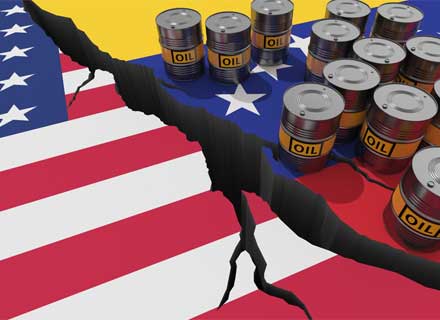The state-run oil company of Venezuela, PDVSA, has started contacting customers with contracts for crude supply, amid the temporary lifting of United States sanctions, resuming cash sales to international refiners.
The Joe Biden administration removed the majority of the six-month limitations on Venezuela’s ability to produce, sell, and export oil to specific markets. Some Venezuelan crude will again be available to consumers who were previously prohibited from transacting, thanks to the wide relaxation of sanctions that have been in place since 2019 in the wake of an election that Washington viewed as fraudulent.
The Office of Foreign Assets Control (OFAC) of the US Treasury issued the license with the intention of promoting a free and fair presidential election in Venezuela in 2024. However, it is not anticipated to instantly result in more exports or dramatically improve Venezuela’s declining oil production.
A large number of PDVSA’s highly qualified employees have left the trading business as a result of inadequate pay for oil traders.
According to experts, this loss of experience means that new discussions can take some time, or result in few new export deals in the six months of the license.
With the greatest crude reserves in the world, Venezuela currently produces 780,000 barrels per day (bpd) on average. The revisions to the license could help PDVSA generate more cash flow by removing some of the intermediaries who are selling its oil to consumers, primarily in Asia, at a discount.
“The OFAC has issued an unprecedented general license that suspends the broad siege imposed on PDVSA,” the company’s CEO and Oil Minister Pedro Tellechea said on social media, Reuters reported.
Under the license granted by OFAC, which is in charge of US sanctions, Venezuela is now able to get paid directly for goods or services.
The limitations on payment had diminished the earnings from sales to PDVSA and its joint companies, which were only permitted to ship goods to settle debt; cash transfers to Venezuela were not permitted. Some US sanctions against PDVSA remained in place.
Experts’ take on the matter
The easing of sanctions on Venezuela may not quickly expand its oil output but can boost profits by returning some foreign companies to its oilfields and providing its crude to a wider set of cash-paying customers, experts believe.
“This looks like a wide lifting of oil sanctions on Venezuela, which is surprising because the license is more expensive than expected,” said Francisco Monaldi, a Latin American energy expert with Rice University’s Baker Institute, while speaking with Reuters.
The Joe Biden government’s move is seen as a measure to ease high oil prices caused due to sanctions on Russia and OPEC output cuts. However, experts believe that Venezuela’s overall exports are unlikely to offset those global production cuts.
To once again become a relevant oil exporter, the Southern American country needs dozens of drilling rigs, billions of dollars in infrastructure replacements for refineries, flow stations and crude upgraders and a reliable power supply.
Venezuela can also inaugurate gas exports if United States-authorized negotiations with Trinidad and Tobago for joint offshore projects progress, while a portion of oil currently going to China can end up in the Caribbean if President Nicolas Maduro re-establishes the country’s Petrocaribe supply program.
Venezuela’s exports to China directly and through trans-shipment hubs have fallen to 437,000 bpd so far in 2023 from 477,000 bpd in 2022, according to vessel monitoring data.
“If Venezuela and China reach a pact to resume debt payments and expand joint oil projects, that could add some extra 100,000 bpd of output in the two-year period,” Monaldi remarked, while adding, “But if no sustained investment happens, it is difficult to predict overall output of more than 1.1 million bpd in the short and medium terms.”

